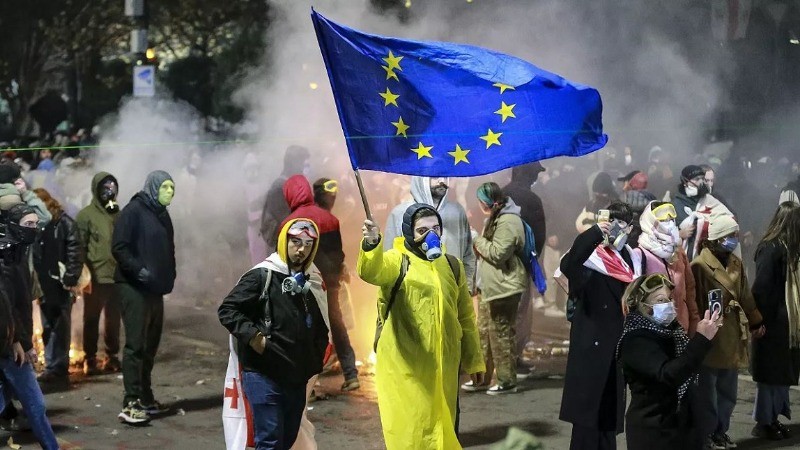
Protests have intensified in Tbilisi, Georgia, as thousands of demonstrators flooded the streets for a second night to voice their discontent over the government’s decision to halt discussions on joining the European Union. Protesters accused the government of betraying Georgia’s aspirations for European integration, a goal enshrined in the country’s constitution.
Protesters Demand Change
On Friday, crowds gathered, chanting "traitors" and holding up images of journalists allegedly attacked by police during protests the previous night. The demonstrations took a dramatic turn as police deployed tear gas and used water cannons extensively to disperse the crowd.
President Stands in Solidarity
President Salome Zourabishvili expressed her support for the protests, stating that a “resistance movement [had] begun” and reaffirming her commitment to Georgia’s European ambitions. “We will remain united until Georgia achieves its goals, to return to its European path, secure new elections,” she said in a televised address.
Civil Servants and Diplomats Join Opposition
Earlier, over 100 Georgian diplomats and civil servants signed an open letter criticizing the government’s decision, calling it contrary to the country’s strategic interests. The move has further deepened the divide between the ruling party and its critics.
Prime Minister Defends Decision
Prime Minister Irakli Kobakhidze defended his government’s stance, accusing the EU of “blackmail” following calls from European legislators to re-run last month’s parliamentary elections, citing irregularities. Despite these claims, Kobakhidze maintained that Georgia remains committed to EU membership but would pursue it with "dignity" and on its own terms, delaying the process until at least 2028.
European Parliament Weighs In
On Thursday, the European Parliament passed a resolution condemning the recent elections as part of Georgia’s “worsening democratic crisis” and holding the ruling party, Georgian Dream, accountable. The resolution highlighted allegations of voter intimidation, vote-buying, manipulation, and harassment of election observers. It also urged sanctions against senior officials, including the party's billionaire founder, Bidzina Ivanishvili.
Public Outcry Escalates
The delay in pursuing EU membership has sparked widespread protests, with demonstrators gathering outside Georgian Dream offices in Tbilisi and Kutaisi. Many view the government’s decision as a betrayal of Georgia's European aspirations, which have been a national priority for years.